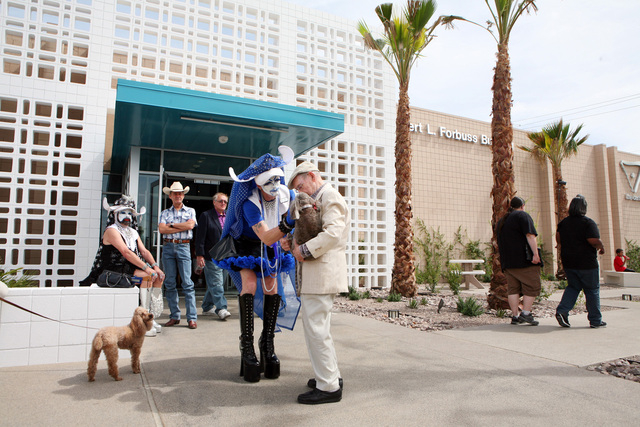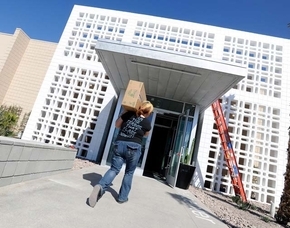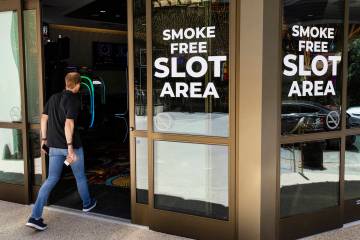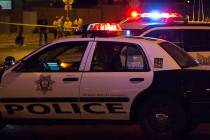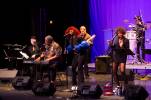International anti-street harassment group looks to Vegas
A grassroots movement formed by activists around the world to end street harassment planted seeds in Las Vegas on Saturday at The Gay and Lesbian Community Center.
Hollaback, an anti-street harassment organization that has activists in 79 cities and 26 countries, aims to to educate young people about personal space and healthy, constructive relationships, said volunteer Gabrielle Amato, education and outreach manager at the Rape Crisis Center.
Women dressed in red capes, with “Super Girl,” “Girl Power” and “strength is willingness to fight back” written on them, shared their stories of street harassment for the Las Vegas launch, which has been in the works since August, Amato said.
But at this point, the local activists have no budget, no Nevada office, no proposed legislation and no educational program except their website and word of mouth.
The local activists planned a superhero-themed kickoff because “active bystanders are superheroes. They have the most power to stop an incident,” Amato said.
For 10 straight hours early this year, New York actress Shoshana Roberts, wearing a T-shirt and jeans, listened to men barrage her with catcalls to give the world a glimpse of everyday street harassment. A video of her experiences went viral on the Internet in October.
The video, “10 Hours of Walking in NYC as a Woman,” was created by Rob Bliss in partnership with Hollaback as a public service announcement about the severity of street harassment, but was ultimately not used by the organization.
Hollaback later deemed it “racially problematic,” because the majority of the harassers featured in the video were “people of color.” The creators of the video said bad audio was to blame for the lack of racial diversity, Amato said.
“People need to use their street smarts” when it comes to intervening, Bliss said. “Things can escalate quickly.”
“Don’t endanger your safety,” Amato said, but “shuffle a couple steps to the left” to block a harasser from a victim when you see an altercation. Let victims know “I’ve got your back,” she said, quoting the Hollaback slogan.
On a trip to Mexico with her family, 18-year-old Jessica Nunez said every time she went out,” some guy would say something.” Tourists tried photographing her and a group of boys tried looking up her dress, she recalled.
“I was trying to hide,” Nunez said. The unwanted attention, comments made her feel uncomfortable and afraid, she said.
Most women will not respond to unwanted attention, said Linda Gallegos, 18-year-old Hollaback intern. “You never know when you say something, what it will escalate to.”
What a woman wears has nothing to do with problematic catcalling, Nunez and Gallegos said. They said they have been harassed in sweat pants and dresses.
The activists will work to empower young adults to take a stand against catcalling and unwanted attention while in public spaces through education and outreach.
Amato said the volunteers are still in the “data collecting” stage and are hoping to “collect a lot of stories.”
During the first official gathering, attendees were encouraged to participate in video interviews of their personal encounters with harassers.
The goal is to get the public, politicians, everyone involved to “make public space safer,” Amato said. Tighter security, more arrests and street signs placed on transit lines, telling people not to make lewd comments, are among the ways Hollaback hopes to eliminate street harassment.
Sexual violence is a pressing issue, but street harassment is “taken the least seriously,” Amato said. Harassers often leave their victims feeling “disempowered, afraid and uncomfortable.”
Amato, Bliss, Gallegos and Nunez all said that street harassment victims are overwhelmingly female.
Contact Kimberly De La Cruz at kdelacruz@reviewjournal.com or 702-383-0381. Find her on Twitter: @KimberlyinLV.
Watch "10 Hours of Walking in NYC as a Woman"



